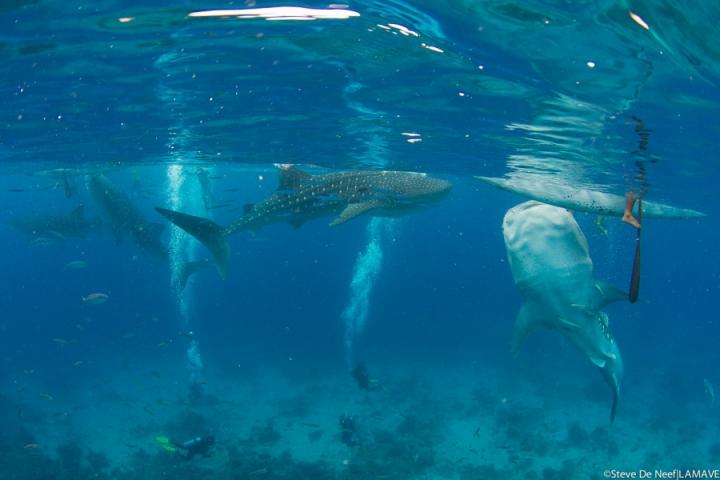A new study reveals the impacts of whale shark mass tourism on the coral reefs in Oslob, Cebu, Philippines

Credit: @LAMAVE
The collaborative research among The University of Hong Kong (HKU), the University of Guam (UoG), and the Large Marine Vertebrates Research Institute Philippines (LAMAVE) shows that whale shark tourism in Tan-awan, Oslob, Philippines has led to degradation of the local coral reef ecosystem. This study, which provides the first documentation of such ecological impact locally in Tan-awan, has recently been published in the scientific journal “Environmental Management“, and provided baseline data to measure future tourism management intervention and the shift towards a more sustainable tourism model.
The Coral Biogeochemistry Lab in the School of Biological Sciences at HKU, one of the top Institutions in Asia, led a research expedition to Oslob in 2015 in collaboration with the University of Guam, the Large Marine Vertebrates Research Institute Philippines and the Local Government Unit of Oslob. This small municipality on the south coast of Cebu, has become a domestic and international tourism hotspot since 2011, attracting over 300,000 visitors in 2015 and doubled since then. The mass tourism phenomenon is fueled by the year-round presence of whale sharks along the local shallow reef. This unusual aggregation is maintained by the local tourism association provisioning (feeding) the whale sharks with up to 50 tons of Uyap (sergestid) shrimps annually. While most of the studies to date focus on the whale shark population and tourism perception, this is the first study that investigates the impacts of intensive provisioning and concentrating tourism activities on the health of the largely understudied yet highly vulnerable local reef ecosystem.
The data presented in the paper shows that in comparison to a reference site further south the coast, Tan-awan is affected by greater impacts of degradation as indicated by higher macroalgae and lower coral density as well as a less diverse coral community dominated by weedy corals (Pocillopora) and stress-tolerant (Porites) corals. Furthermore, using the advanced technique of stable isotope analysis on the individual growth ring (biogenic archives) of the species studied, preliminary results reveal anthropogenic nitrogen inputs in Tan-awan.
“It is vital for all stakeholders to understand that the environmental and societal well-being go hand in hand. I hope that everyone can come to the table to contribute to management and conservation efforts to reverse the trend of reef degradation in Tan-awan”. -Martin Wong, University of Hong Kong.
The finding of reef degradation in Tan-awan is alarming and requires immediate attention given reef health underpins the ecosystem services afforded to the local communities, including the important tourism sector. As the whale shark tourism is projected to grow continuously in the foreseeable future, the research team urges the need for local authorities to implement proper management strategies to mitigate the problems and risks associated with the rapid tourism development.
This collaborative research effort to document the state of reef health and nitrogen pollution sources also provide an ecological baseline for future data to compare with. Having such critical information, further monitoring programs can be carried out in order to keep reef health in check and evaluate the effectiveness of any mitigation and management measures towards reef conservation.
“Let this be a new beginning. We are positive that with this baseline data at hand the local authorities will look further into the long term and broader ecological impact of mass tourism activities, in Oslob as in many other areas in the country and put a priority into the conservation of their marine resources, shifting towards sustainable tourism and ensuring the local food security through the conservation and restoration of healthy marine ecosystems.” – Dr Ponzo Large Marine Vertebrates Research Institute Philippines.
###
Study: https:/
Notes to the Editor
Corresponding Author: Dr David M. Baker
Contact: [email protected]
The Swire Institute of Marine Science and School of Biological Sciences, The University of Hong Kong, Hong Kong Special Administrative Region, China. https:/
University of Guam Marine Laboratory, 303 University Drive, Mangilao, GU 96923. http://www.
Department of Earth Sciences, The University of Hong Kong, Hong Kong Special Administrative Region, China. https:/
Large Marine Vertebrates Research Institute Philippines (LAMAVE) is the largest independent non-profit non-governmental organization solely dedicated to the conservation of marine megafauna and their habitats in the Philippines. LAMAVE strives for conservation through scientific research and education. http://www.
The study can be viewed at the link below and should be cited as follows:
Wong, C.W.M., Conti-Jerpe, I., Raymundo, L.J. et al. Environmental Management (2018). https:/
Media Contact
Cindy Chan
[email protected]
852-391-75286
Original Source
https:/
Related Journal Article
http://dx.




